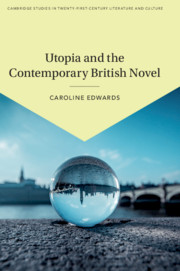Book contents
- Utopia and the Contemporary British Novel
- Cambridge Studies in Twenty-First-Century Literature and Culture
- Utopia and the Contemporary British Novel
- Copyright page
- Dedication
- Contents
- Acknowledgements
- Chapter 1 Introduction
- Chapter 2 Reading Fictions of the Not Yet
- Chapter 3 Death
- Chapter 4 Transmigration
- Chapter 5 Apocalypse
- Chapter 6 Epilogue
- Notes
- Bibliography
- Index
Chapter 2 - Reading Fictions of the Not Yet
Published online by Cambridge University Press: 01 July 2019
- Utopia and the Contemporary British Novel
- Cambridge Studies in Twenty-First-Century Literature and Culture
- Utopia and the Contemporary British Novel
- Copyright page
- Dedication
- Contents
- Acknowledgements
- Chapter 1 Introduction
- Chapter 2 Reading Fictions of the Not Yet
- Chapter 3 Death
- Chapter 4 Transmigration
- Chapter 5 Apocalypse
- Chapter 6 Epilogue
- Notes
- Bibliography
- Index
Summary
This chapter builds a new interpretative, cross-disciplinary model for identifying and understanding non-contemporaneity in British fictions of the not yet. Whilst many critics have commented in recent years upon the resurgence of temporality in critical and literary discourse, few studies have explored the literary representation of time across a range of disciplinary approaches. This chapter considers twenty-first-century analyses of temporality in literature as they are developing within the ‘new‘ modernist studies, post-spatial approaches to literary postmodernism, ‘post-classical‘ studies of temporal organisation within narratology, and cosmopolitan and post-secular readings of fiction. The chapter also considers key developments in utopian studies over the second half of the twentieth century, which paved the way for a study of utopian anticipation in the contemporary period. The chapter concludes by arguing for a more nuanced model of non-contemporaneous times that can help us parse the utopian dimensions of lived time as it is represented in innovative contemporary narrative forms.
Keywords
- Type
- Chapter
- Information
- Utopia and the Contemporary British Novel , pp. 34 - 75Publisher: Cambridge University PressPrint publication year: 2019

